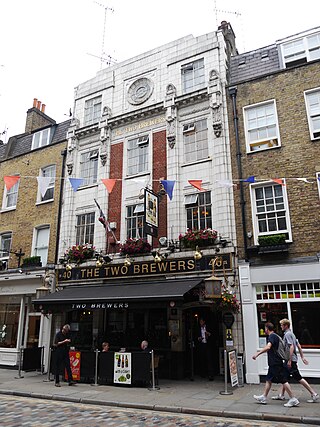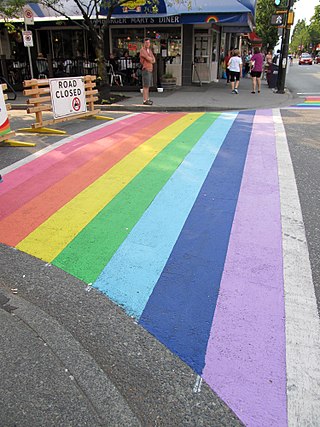
Pub names are used to identify and differentiate traditional drinking establishments. Many pubs are centuries old, and were named at a time when most of their customers were illiterate, but could recognise pub signs. The use of signage was not confined to drinking establishments. British pubs may be named after and depict anything from everyday objects, to sovereigns, aristocrats and landowners. Other names come from historic events, livery companies, occupations, sports, and craftsmen's guilds. One of the most common pub names is the Red Lion. This list contains both modern and historical examples.

The Borough Compter was a small compter or prison initially located in Southwark High Street but moved to nearby Tooley Street in 1717, where it stood until demolished until 1855. It took its name from 'The Borough', a historic name for the Southwark area of London on the south side of the River Thames from the City of London. This replaced a lock-up as part of the city's court house under the jurisdiction of the Lord Mayor and Court of Aldermen of the city, and their High-Bailiff of Southwark. This first court house was converted from the old church of the parish St Margaret. A floor was made across the level of the church's gallery and the windows below that were blocked in, the Court Room being on the first floor. This structure was destroyed in the Great Fire of Southwark in 1676.

Comptons of Soho is a gay pub in London. Situated at 51–53 Old Compton Street in the heart of Soho's 'Gay village', Comptons has been an integral part of London's gay scene since June 1986.

Beautiful Thing is a 1996 British romantic comedy film directed by Hettie MacDonald and released by Channel 4 Films. The screenplay was written by Jonathan Harvey based on his own original play of the same name.

The Royal Pavilion Tavern, commonly known as the Pavilion Tavern or Pav Tav and since February 2022 as The Fitz Regent, is a pub in the centre of Brighton, part of the English coastal city of Brighton and Hove. Converted from a house into the Royal Pavilion Hotel in the early 19th century, its original role soon changed from a hotel to a pub, in which guise it remained until its closure in September 2019. It reopened under its new name, but still in the ownership of the Mitchells & Butlers chain, on 13 February 2022. The building was also used as a court for several years early in its history, and prominent local architect Amon Henry Wilds was responsible for its redesign as a hotel and inn. English Heritage has listed the building at Grade II for its architectural and historical importance, and it stands within a conservation area.

The Pride of Spitalfields is a public house at 3 Heneage Street in Spitalfields in the East End of London, just off Brick Lane. It was associated with a Jack the Ripper suspect.

The Magdala, also known as The Magdala Tavern or colloquially as simply The Magy, is a pub on South Hill Park in Hampstead, north London. Named after the British victory in the 1868 Battle of Magdala, it was the site of a notorious murder in 1955.
The LGBT community in London is one of the largest within Europe. LGBT culture of London, England, is centred on Old Compton Street in Soho. There are also LGBT pubs and restaurants across London in Haggerston, Dalston and Vauxhall.

The Two Brewers is a pub in Covent Garden, London, at 40 Monmouth Street.

Vancouver's LGBT community is centered on Davie Village. Historically, LGBT people have also gathered in the Chinatown and Gastown neighborhoods. Former establishments include Dino's Turkish Baths, a gay bathhouse on Hastings, and the city's first drag bar, BJ's, on Pender Street.
LGBT culture in Leeds, England, involves an active community of people who identify as lesbian, gay, bisexual, or transgender/transsexual. A BBC News Online article published in 2012 stated that, while Leeds City Council has not published statistics relating to the number of LGBT residents, the figure can be estimated at 10% of the overall population, which currently suggests a total of at least 77,000. The tenth year of the Leeds Pride march and celebration, held in 2016, was attended by over 40,000 people.

The Place Harvey Milk is a public square in Paris, France. It lies at a junction in Le Marais, at the intersection of the Rue des Archives and the Rue de la Verrerie, at the heart of the French capital.

Public houses, popularly known as pubs, are a significant feature of the history and culture of the English seaside resort of Brighton. The earliest pubs trace their history back to the 16th and 17th centuries, when present-day Brighton was a fishing village. Several coaching inns were founded in the 18th century as transport improved and communications with other towns developed, and around the same time other pubs became established in the fashionable Old Steine area in Brighton's early years as a resort. Many new pubs, originally beerhouses, were established after an Act of Parliament in 1830 loosened restrictions; two of these "Beerhouse Act" pubs remain in business. In the following decade the opening of Brighton's railway station provided another major boost to the pub trade, and by the late 19th century there were nearly 800 licensed venues in the town. Numbers declined gradually—as late as 1958 there was said to be "one pub for every day of the year"—and by the early 21st century around 300 pubs were still trading, with others having closed but surviving in alternative use.
The Rainbow Plaque programme is a UK scheme installing commemorative plaques to highlight significant people, places and moments in LGBTQIA+ history. Emulating established UK blue plaque programmes run by English Heritage, local authorities and other bodies, the first permanent rainbow plaque was unveiled in York in July 2018. Some UK LGBT locations are denoted by pink plaques, an idea that predated rainbow plaques.












